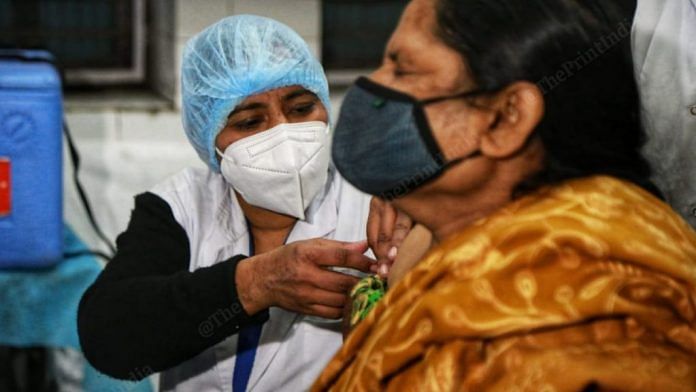
New Delhi: The Covid-19 vaccine is expected to arrive at Delhi’s only vaccine storage facility, Rajiv Gandhi Super Speciality Hospital (RGSSH), as early as next week, ThePrint has learnt.
The hospital, run by the Delhi government and among the key Covid-19 facilities in the national capital, has undergone robust preparations for the storage of vaccines, which will first be used to inoculate around 3 lakh health workers in Delhi before other priority groups are immunised.
“We are expecting the vaccines to arrive early next week,” hospital director Dr B.L. Sherwal told ThePrint. “However, we do not know which vaccine will come to us yet.”
The Union government has so far issued emergency-use authorisation to two vaccines — the Oxford-AstraZeneca candidate Covishield, manufactured in India by the Serum Institute of India, and Bharat Biotech’s Covaxin, which has been approved for use in “clinical trial” mode since it has been cleared on the basis of incomplete Phase 3 data.
The three-floor utility-area building of the RGSSH, located in a relatively secluded corner of the campus, will serve as the nerve centre of the vaccine storage exercise. It has been locked and taken over by the Delhi government’s directorate of family welfare ahead of the arrival of vaccine vials.
Discussing the preparations made, hospital officials said they have put in place elaborate security arrangements.
“No one will be allowed to enter unless we get directions from the government now,” said RGSSH spokesperson Dr Chhavi Gupta.
What the preparations entail
Officials involved in the process said the three floors together constitute an area of 4,700 square feet.
“Initially, we were only going to use the ground and the first floor, which is where the vaccine will be kept in refrigerators under adequate temperature,” said Dr Gupta.
However, he added, the third floor was also included to keep the syringes and other essentials that will be required for the vaccination programme.
A total of 40-50 refrigerators have been installed in the storage facility to ensure the vaccines can be stored in a temperature range of 2-8 degrees Celsius, Dr Gupta said.
According to him, this is the temperature window they have been asked to prepare for.
More freezer boxes and refrigerators are expected to arrive this week, he added, saying the facility can store about 50,000 vaccines.
“However, we haven’t been informed about the size of each vaccine vial yet and hence we can’t give the exact number,” he said.
Each vial, it is estimated, will carry between 4.6 ml to 5 ml of the vaccine, with a 5 ml vial comprising eight doses on average, ThePrint has learnt from officials at RGSSH.
‘Security most crucial’
RGSSH Deputy Medical Superintendent Dr Namrata Makkar said a lot of emphasis is being laid on the safety and security of the storage facility.
“Besides our own security guards, Delhi Police personnel will also be deployed here to ensure proper protection,” Makkar said, adding that CCTV cameras have been installed inside the building especially for this purpose.
Only those provided with access-control cards to the storage facility will be allowed to enter once the vaccines arrive, she added.
Vaccine facilities in the city
From RGSSH, the vaccines will be transported to 621 cold-chain facilities set up across the city, some of which double up as vaccination centres. There are 1,000 vaccination centres in total in the capital, comprising primary and community healthcare centres, dispensaries, and hospitals.
“Some of the primary health clinics will also serve as cold-chain points besides serving as vaccination centres, while other centres, which do not include a cold-chain point, will receive the vaccine from the closest cold-chain point,” said Dr Suneela Garg, sub-dean of Maulana Azad Medical College, a key member of the task force handling vaccination in Delhi.
Cold-chain points have been selected on the basis of the number of beneficiaries in the vicinity or closest vaccination booths, Garg added.
Sir Gangaram Hospital, a private facility that is among the vaccination centres in the city, has trained 50 hospital staff for vaccine administration, and will conduct a dry run of its own — different from the government exercise conducted last week — Wednesday.
“We have not been given an indication for when the vaccination drive could start, but we are ready. We have trained 50 staff and have requested the government to inform us one day before so we can set up two waterproof tents for vaccine administration,” said Brig. Dr S. Katoch, medical director of the hospital. “We are prepared to vaccinate 200 to 1,000 people in a day.”
Subscribe to our channels on YouTube & Telegram
Why news media is in crisis & How you can fix it
India needs free, fair, non-hyphenated and questioning journalism even more as it faces multiple crises.
But the news media is in a crisis of its own. There have been brutal layoffs and pay-cuts. The best of journalism is shrinking, yielding to crude prime-time spectacle.
ThePrint has the finest young reporters, columnists and editors working for it. Sustaining journalism of this quality needs smart and thinking people like you to pay for it. Whether you live in India or overseas, you can do it here.